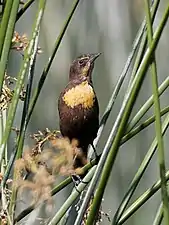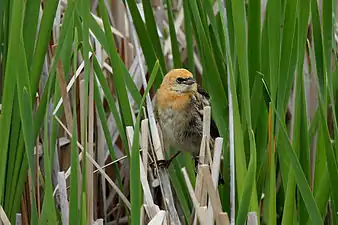Yellow-headed blackbird
The yellow-headed blackbird (Xanthocephalus xanthocephalus) is a medium-sized blackbird, and the only member of the genus Xanthocephalus.
| Yellow-headed blackbird | |
|---|---|
 | |
| Male in British Columbia, Canada | |
| Scientific classification | |
| Kingdom: | Animalia |
| Phylum: | Chordata |
| Class: | Aves |
| Order: | Passeriformes |
| Family: | Icteridae |
| Genus: | Xanthocephalus Bonaparte, 1850 |
| Species: | X. xanthocephalus |
| Binomial name | |
| Xanthocephalus xanthocephalus (Bonaparte, 1826) | |
 | |
| Range of X. xanthocephalus Breeding range Wintering range Year-round range | |
Description
Measurements:[2]
- Length: 8.3-10.2 in (21-26 cm)
- Weight: 1.6-3.5 oz (44-100 g)
- Wingspan: 16.5-17.3 in (42-44 cm)
Adults have a pointed bill. The adult male is mainly black with a yellow head and breast; they have a white wing patch sometimes only visible in flight. The adult female is mainly brown with a dull yellow throat and breast. Both genders resemble the respective genders of the smaller yellow-hooded blackbird of South America.
The breeding habitat of the yellow-headed blackbird is cattail (Typha species) marshes in North America, mainly west of the Great Lakes. The nest is built with and attached to marsh vegetation. They nest in colonies, often sharing their habitat closely with the red-winged blackbird (Agelaius phoeniceus). During the breeding and nesting season the males are very territorial and spend much of their time perched on reed stalks and displaying or chasing off intruders. Yellow‐headed blackbirds have been found to be sensitive to nest predation risk, for example by marsh wrens Cistothorus palustris, and alter their nest attendance behaviour accordingly.[3]
These birds migrate in the winter to the southwestern United States and Mexico. They often migrate in huge flocks with other species of birds. The only regions of the United States where these blackbirds are permanent residents are the San Joaquin Valley and the Lower Colorado River Valley of Arizona and California. It is an extremely rare vagrant to western Europe, with some records suspected to refer to escapes from captivity.
These birds forage in the marsh, in fields or on the ground; they sometimes catch insects in flight. They mainly eat seeds and insects. Outside the nesting period, they often feed in flocks, often with related species.
This bird's song resembles the grating of a rusty hinge.
Gallery
 Female
Female Juvenile
Juvenile.jpg.webp) Yellow-headed blackbirds in flight
Yellow-headed blackbirds in flight.jpg.webp) Group of yellow-headed blackbirds in Wyoming
Group of yellow-headed blackbirds in Wyoming Roosting flock, Whitewater Draw, Arizona
Roosting flock, Whitewater Draw, Arizona
References
- BirdLife International (2012). "Xanthocephalus xanthocephalus". IUCN Red List of Threatened Species. 2012. Retrieved 26 November 2013.CS1 maint: ref=harv (link)
- "Yellow-headed Blackbird Identification, All About Birds, Cornell Lab of Ornithology". www.allaboutbirds.org. Retrieved 30 September 2020.
- Behrens, C.; Ruff, Z.J.; Harms, T.M.; Dinsmore, S.J. (2019). "Predator density influences nest attendance of Yellow‐headed Blackbirds Xanthocephalus xanthocephalus". Ibis. 161 (3): 679–685. doi:10.1111/ibi.12705.
External links
| Wikimedia Commons has media related to Yellow-headed blackbird. |
| Wikispecies has information related to Xanthocephalus xanthocephalus. |
- Yellow-headed Blackbird - Cornell Lab of Ornithology
- Yellow-headed blackbird - Xanthocephalus xanthocephalus - USGS Patuxent Bird Identification InfoCenter
- Video of a female yellow-headed blackbird in Annapolis Valley, Nova Scotia, Canada, well outside its normal range.
- "Yellow-headed blackbird media". Internet Bird Collection.
- Yellow-headed blackbird photo gallery at VIREO (Drexel University)
